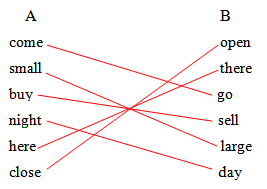|
Text A
Shopping Malls Now millions of people do their shopping in shopping malls or malls all over the world. Malls contain supermarkets, large department stores and small shops. There are many clothes stores for men, women and children. Gift stores sell all kinds of things from cheap hairpins to expensive watches, even diamonds. There are also a lot of arts and crafts stores. It is a good idea to have a look at these stores. And there are some record stores around the corners. There you can buy discs or tapes of any hot star. Shopping malls have other service, too. Health centers help people to stay in shape. Eating-places like hot dog stands or French restaurants are good places to have a rest. Malls have large cinemas. These cinemas show many hot films. Shopping malls can meet almost all of your needs. Exercises for Text A
I. 根据课文回答下列问题。 1. Where do many people do their shopping now? 2. What stores do shopping malls contain? 3. Can you buy clothes in malls? 4. What do gift stores sell? 5. Where are record stores in malls? 6. What can you do in eating-places there? 7. Can you see hot popular films in the malls? Where? 8. Do you like shopping mall? Why?
1. Many people do their shopping in shopping malls now. 2. Shopping malls contain supermarkets, large department stores and small shops. 3. Yes, we can. 4. Gift stores sell all kinds of things from cheap hairpins to expensive watches, even diamonds. 5. Record stores are usually around the corner. 6. You can have a rest there. 7. Yes. We can see hot films in cinemas in malls. 8. Yes, because it can meet almost all our needs.
II. 将下列短语译成英语。 1.数以百万计的 2.当红明星 3.全世界 4.满足……需要 5.购物中心 6.百货商场 7.从廉价的发卡到昂贵的手表 8.看一看 9.保持健康 10.休息一会儿
1. millions of 2. hot star 3. all over the world 4. meet the needs of ... 5. shopping mall 6. department store 7. from cheap hairpins to expensive watches 8. have a look 9. stay in shape 10. have a rest |
|
Dialogue
In a Menswear Shop (Bill goes into a menswear shop. He wants to buy a sweater for his father. S=sales assistant, B=Bill.) S: Can I help you? B: Yes, please. I’d like to buy a sweater for my father. S: How about this plain brown one? B: How much is it? S: 400 yuan. B: It’s very expensive, isn’t it? S: Yes, it’s a bit. But I can give you a discount of 20%. B: How about 280 yuan. S: No, I’m sorry. I can only give you that discount. B: OK. A deal. Text B
Shops in Britain Most shops in Britain open at 9:00 a.m. and close at 5:00 or 5:30p.m. Small shops are usually closed for an hour at lunchtime. For one or two days a week some large food shops close at about 8:00p.m. for late shopping. The day is usually Thursday or Friday, or both Thursday and Friday. Many shops are closed in the afternoon of one day each week. The day is usually Wednesday or Thursday and it is often a different day in different town. Few shops are open on Sundays. People cannot buy most things on Sundays. Newspaper stands are open in the morning and sell sweets and cigarettes besides newspapers and magazines. Exercises for Text B
I. 根据课文回答下列问题。 1. When do most shops in Britain open? 2. On what day are many shops closed in the afternoon? 3. What do newspaper stands sell? 4. Are most shops closed on Sundays? 5. Are the opening and closing time of Britain (英国)shops the same as those in China?
1. Most shops in Britain open at 9:00 a.m. 2. The day is usually Wednesday or Thursday and it is often a different day in different town. 3. Newspaper stands sell newspapers, sweets and cigarettes as well. 4. Yes, they are. 5. No, they are different.
II. 将A栏的词汇与B 栏中的反义词相搭配。
III. 将下列短语译成英语。 1.在吃午饭时间 2.卖香烟 3.报摊、报刊亭 4.在营业 5.一周一天 6.在星期三
1. at lunchtime 2. sell cigarettes 3. newspaper stand 4. be open 5. one day each week 6. on Wednesday |
语法要点
I. 介词的用法(三)
II. 形容词及其作为名词修饰语的位置 形容词(adjective)用来修饰名词或代词,表示人或事物的特征属性,在句子中可用作定语、表语或补语。形容词修饰名词时通常前置,但有时也后置。作为前置修饰语,形容词在名词词组中的位置总是在限定词之后、名词中心词之前。例如 There are some beautiful flowers on the table. (桌子上有些漂亮的花。) 如果同时有几个形容词出现在名词中心词之前,则须按一定顺序排列。一般来说,意义较具体的或与名词关系较密切的形容词通常放得更靠近被修饰的名词。形容词的排列顺序一般为: 限定词 →表示品质、外观等的形容词 →表示大小、形状的形容词 →表示年龄、新旧的形容词 →表示颜色的形容词 →表示国籍、地区、出处的形容词 →表示物质、材料的形容词 →表示用途、类别的形容词 →名词。 另外,如果有两个或两个以上的形容词作前置修饰语,这些形容词在同一层次上,可以用连词或逗号隔开。例如: an old [品质] blue [颜色] shirt 一件旧的蓝色衬衣 a girl with beautiful [品质] long [形状] black [颜色] hair (一个长着又长又黑又漂亮的头发的女孩) three [数字] expensive [品质] brown [颜色] Japanese [国籍] car (三辆昂贵的棕色日本汽车) the boy’s first two [数字] interesting [品质] small [大小] white [颜色] English [国籍/ 产地] toy dogs (那个男孩子的最早的两个有趣的白色的英国产的小玩具狗)。 III. 情态动词的用法 情态动词(modal verb)表示说话者对所说话语的态度或看法,或表示主观设想及其他情态意义。情态动词本身虽有词义,但不表示动作,表示动作的是它们后面的原形动词。此外,它们的第三人称单数现在时没有词形变化,即没有-s 形式。 can 是最常用的情态动词之一,表示“能力”、“许可”和“可能”。例如: Who can help him?(谁能帮他?)(can 表示能力) I can come tomorrow.(我明天可能会来。)(can 表示可能) There you can buy discs and tapes of any popular star.(在那儿你能够买到任何当红明星的影碟或音带。)(can 表示能够) You can go now.(你可以走了。)(can 表示许可) 情态动词 can 的肯定式、疑问式和否定式
注:can 的否定形式 cannot ,口语中多缩合为can’t may 表示“许可”、“可能”。用may 可表示许可或征求对方许可表示许可用于陈述句,而表示征求听话人许可则用于疑问句或 if 分句中。回答这种疑问句时多半不用 may ,以免显得不客气。如: - May I come in? -Yes, please. (— 我可以进来吗?—刻意,请进。) - May I take this shirt? - Certainly. (— 我可以拿这件衬衣吗?— 当然可以。) 用 may 表示“可能” 通常只用于肯定陈述句或否定陈述句; 在许多场合下 can 可以代替 may. must 表示“必须”、“应该”。例如: We must help each other.(我们应当互相帮助。) You must get up before 7 o’clock in the morning.(你们早上必须在7点钟之前起床。) Should 表示“应该”或“推测”。例如: You should go and see your father.(你应该去看望你父亲。) We shouldn’t stay here.(我们不应该呆在这里。) |



